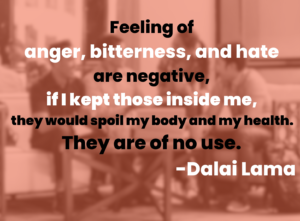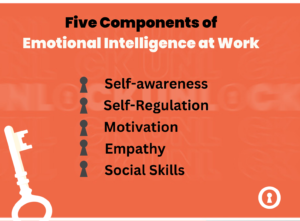Introduction
The capacity to effectively comprehend and manage emotions is emotional intelligence. In addition to improving relationships and fostering a positive work environment, emotional intelligence in the workplace can offer significant advantages and further your career development.
Psychologist Daniel Goleman popularized the term “emotional intelligence” during the 1990s with his book “Emotional Intelligence: Why It Can Matter More Than IQ.”
Goleman identifies five essential characteristics of high EQ in his book:
- Self-awareness. Self-awareness is the capacity to recognize not only your own limitations but also the ways in which you behave and react to other people, situations, and events in your life.
- Self-regulation. Self-regulation is the process of controlling how you feel and think before you act, especially in difficult situations.
- Motivation. The drive toward personal development and growth is motivation.
- Empathy. The capacity to comprehend the emotions of other people without judging them, even if they are different from you, is called empathy.
- Social skills- Social skills include being aware of other people and communicating with them by listening, engaging, and making others feel comfortable talking to you.
We will go over the five components of emotional intelligence, their significance, and the steps you can take to develop your emotional intelligence at work in this article.
How does emotional intelligence work?
The capacity to appreciate anyone on a profound level (EI) is at times likewise alluded to as close to home remainder (EQ) and it’s the capacity to comprehend and deal with feelings. In the event that you are genuinely savvy, you can deal with relational connections sympathetically, and a high capacity to understand people on a deeper level can assist you with better accomplishing your expert objectives
The Five Components of Emotional Intelligence at Work
These were developed in the 1990s by psychologist Daniel Goleman. Goleman is well-known for developing them. Those parts, along with some examples of how they are used in the workplace, are as follows
1. Self-awareness
The capacity to recognize one’s own feelings and emotional triggers is called self-awareness. Understanding how other people might perceive your emotions is made easier when you are aware of your feelings. Self-awareness can help you learn how your coworkers, clients, and managers see you at work.
2. Self-regulation.
The ability to control and adjust your emotions in order to have a more positive effect is known as self-regulation. Because your feelings have a big impact on other people, it’s important to be in control of them at all times. In order to maintain a professional appearance in front of clients, you might be able to control your emotions while working by adjusting your feelings.
3. Motivation
It is the urge or desire to do something. Emotional intelligence is related to motivation because desires can cause different feelings toward something. For instance, wanting to finish all your everyday responsibilities effectively may be shown as characteristic inspiration to your boss — and an approach to satisfying your own inward necessities and objectives.
4. Empathy
It is the capacity to recognize and comprehend another person’s emotions. You will be better able to handle situations in the workplace if you are aware of how others feel. For instance, if a coworker is expressing signs of dismay, you can respond with empathy to alleviate a potentially dire circumstance.
5. Social skills.
The tools used to communicate and interact with other people are known as social skills. You will be able to listen, speak, and resolve conflicts more effectively if you have stronger social skills like respect and effective communication. Social skills are essential tools for leaders and can be used in the workplace to advance your career.
Also Read: Soft Skills: A guide on how to upskill yourself
What is the significance of emotional intelligence in the workplace?
Being able to perceive, reason with, comprehend, and manage one’s own and other people’s emotions is an important work skill. You can guide and assist others and be happier and more successful if you are able to manage your emotions.
Emotional intelligence is important in the workplace for a number of reasons, including helping you:
Learn to interpret nonverbal communication: You have the opportunity to resolve an issue before it becomes a problem. Take a coworker aside to show empathy, for instance, if you notice them making nonverbal signs of sadness.
Be aware of your own feelings: This ability can help you change your behavior before it becomes a problem for a customer or coworker. For instance, if you are aware that you had a difficult night, you might attempt to alter your behavior the following workday by focusing on feelings that are more upbeat.
Enhance efficiency: Empathy and empathy for other people’s feelings make it easier to make decisions and complete tasks more quickly.
Advance your profession: Leadership abilities and emotional intelligence go hand in hand. You can earn a title promotion or raise by actively demonstrating skills like patience, active listening, positivity, and empathy. You can also advance to a leadership position.
Inspire others to cultivate effective interpersonal skills: Because emotions are contagious, demonstrating explicit motivation, empathy, accountability, and teamwork might encourage your team to follow suit.
How to Increase Your Emotional Intelligence at Work
Emotional intelligence can Play a Big Role in Your Success at Work Improving emotional intelligence in the workplace can boost morale and productivity for all involved.
Emotional intelligence can be improved in the workplace by following these five steps:
1. Identify your weaknesses
It is beneficial to identify your weaknesses before beginning to improve your emotional intelligence. You can help yourself become a better communicator by self-assessing your emotional weaknesses.
For instance, you might be very good at assisting people who express their feelings verbally, but you might not be as good at recognizing nonverbal communication. When you write about your weaknesses, be honest with yourself and frequently review your list to see where you can improve.
2. Review your emotional intelligence history
Continue your evaluation by reviewing your emotional intelligence history following your self-evaluation of your weaknesses. You can think about how you handled various situations by looking back at your emails and text messages. For instance, you might come to the realization of a situation in which you could have responded to someone with more empathy. You can learn more about how to handle similar situations in the future by reflecting on your communication.
3. Receiving feedback
You must receive feedback from people you trust can greatly assist in understanding your emotional tendencies. These people will be open about how you communicate, and what they say about you could be very telling. You might want to think about asking a friend or family member to comment on how well you communicate with others. Learn from this piece of advice how other people might see you and what you can do to change that.
4. Request help
To work on capacity to understand people on a deeper level in the working environment, think about requesting help from your director or a coach. Ask them for advice on how they can assist you in improving your leadership or communication abilities. For instance, you should seriously mull over going to a preparation course or partaking in a work environment movement that could help the whole group.
5. Engage in daily emotional intelligence
training Engage in daily emotional intelligence training from both yourself and others. You can make a list of areas where you can improve by recognizing your weaknesses and asking for assistance and feedback.
Some tasks, like looking in the mirror to evaluate your body language and facial expressions, may only involve you. Communicating with a variety of people to practice your emotional intelligence in the real world might be another task. You can advance professionally and inspire others to do the same by working on your emotional intelligence.
Also Read: Most Important Management Theory
How do high emotional intelligence individuals appear?
Regardless of EQ, each person has a unique personality.
However, Goleman’s five characteristics may be more pronounced in those with high emotional intelligence than in those with lower EQ.
An individual with a high EQ could seem to be more receptive and compassionate. During times of emotional or stressful situations, they might appear composed and collected. They might also be driven to do better and be better.
People who have higher EQs are more likely to consider a person’s perspective before responding.
The role of emotional intelligence in success
Emotional intelligence may be linked to a variety of advantages that could give you a leg up in life, despite the fact that characteristics like creativity and optimism are thought to be crucial to success.
Emotional intelligence is one of the top 10 skills needed for professional success in 2020 and beyond, according to the World Economic Forum.
People place a wide range of values on “success,” and this doesn’t always mean how much money you make. However, it’s possible that a higher salary is related to emotional intelligence.
While emotional intelligence may come naturally to some individuals, this is not always the case for all personality types.
There are numerous methods for improving EQ. A higher EQ may be possible to cultivate through work and self-awareness.
Before you begin to notice a change in yourself, you might need to try a few different things. For many people, the best approach to enhancing EQ may be a combination of several approaches.
While disturbing or distressing circumstances emerge, focus and perceive the feelings you are feeling.
Keep an eye on how you typically react when you’re in an emotional situation. It can be helpful to wait before reacting, regardless of how upset you are.
For instance, before responding to a friend who continually cancels plans you’ve made, consider how you feel about the situation. Wait a few days before writing a note to your friend to let them know how hurt you are if you are mad. You can solicit the assistance of friends, family, coworkers, or loved ones in assessing your emotional intelligence. You might inquire if you appear to possess the following characteristics:
empathetic, flexible, adaptable, and cooperative If they give you feedback, it might be good to think about ways to raise your EQ.
Self-awareness and emotional control may benefit from mindfulness, the practice of focusing on the present moment rather than worrying about distant or uncontrollable events.
By keeping you grounded and improving your ability to deal with stressful or emotional situations, mindfulness practice may also assist in stress reduction.
Conclusion
Positive emotional response and the capacity to recognize and comprehend another person’s emotions are measured by EQ. Emotional intelligence (EQ) is now widely recognized as an essential component of a person’s personality, despite the fact that it may have been overlooked in the past.
In the workplace, EQ can be helpful, particularly for stress management and collaboration. High ability to appreciate anyone on a deeper level might be especially useful for those in influential positions who oversee others.
Know that you are not alone if you believe you need to raise your EQ. Emotional intelligence (EQ) can be developed, but it isn’t always easy for everyone or for all personality types.
Increasing empathy and maintaining emotional self-awareness are two ways to achieve higher EQ.
Like most methods for improving oneself, you might have to try a few different things before you find the one that works best for you. EQ can often be improved by combining multiple approaches.
Before seeking support, taking an emotional intelligence assessment test or reviewing an emotional and social competence inventory can help you figure out where you stand with your own EQ.



















Comments 1